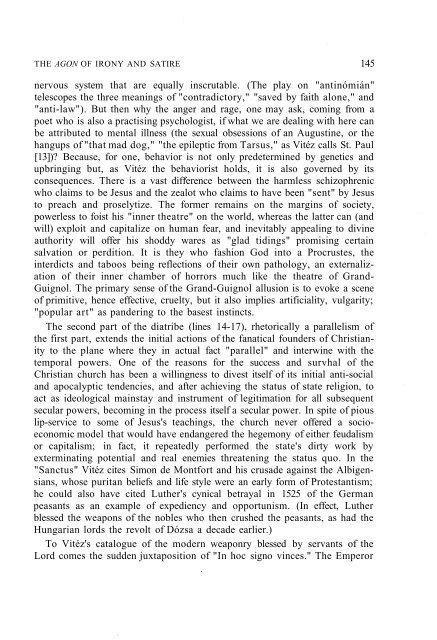144 LÁSZLÓ K. GÉFINalso typify obtuseness and compacency regarding the discrepancies withinreligion and conceivably include the hypocrite lecteur, as if to warn: de tefabula narratur.) The specific examples, taken mainly from the 16th century(age of reformation, counter-reformation, religious wars, conversions andreconversions) serve to illustrate the general "history lesson" announced by the"teacher" suddenly coming to center stage. It is the voice of the satiristreducing complex issues to a single judgment; the tone is properly stern andapodictic, the diatribes full of scorn and (ultimately) righteous indignation.The Anabaptists are singled out because they were the first victims of bothCatholic and Protestant persecution (in Zurich, with Zwingli's consent, theywere put to death by drowning in 1525), 4 yet only seven years later, aftercapturing the city of Münster and establishing a brief "heaven on earth," theyin turn butchered their enemies. (Vitéz's comment in the Kyrie on this viciouscircle is apposite: "ülni nem tud a püfölt ember / (de ölni!)" [12] [the floggedman can't sit still / but can he kill!]). Similarly, the Spanish physicianturned-reformerServetus (author of the Restitution of Christianity, a book thatdrove Calvin to near apoplexy) was burned at the stake in Geneva after Calvinhad denounced him to the secular authorities as a heretic. Servetus had gonebeyond most reformers by denying the holy trinity, calling it a "three-headedCerberus" 5 which Vitéz echoes in the Credo by citing a certain Canon F. who"in a state of inebriation" had called the Holy Ghost "trousers with three legs"[32]. Servetus reappears shortly thereafter when Vitéz comments on one of theCredo's murkier passages about the holy spirit "qui expatre filioque procedit"[32] which was singled out by Servetus as having no scriptural foundation(similarly to Erasmus's proof that the Comma Johanneum had been injectedinto the First Epistle of John after Nicea). 6Vitéz's intertextual ironies operate by juxtaposing and overlapping historicaldata, leaving them in unresolved tension; it is their content, the hairsplittingdogmatism coupled with unspeakable cruelties that arouses thesatirist's anger, which lies at the core of the diatribes (lines 9-13 and 14-17).In accounting for the horrors of intolerance and fanaticism, Vitéz is nosentimentalist â la Rousseau; he appears closer to Swift's Christian conservatismaccording to which the human being is not a sovereign animal rationale,but an animal rationis capax, i.e., an animal only capable of reason. Humannature is corrupt and so is reason; it can only fulfill its capacity by relying ondivine guidance. The exercise of reason alone is tantamount to pride, the objectof Swift's most vicious rebuke (cf. end of Book IV of Gulliver's Travels).Inferring from the allusions in the diatribes, Vitéz would only go so far as toimply that evil is not metaphysical in origin, the result of some mysterioussin of disobedience but the outcome of the contradictions in the human
THE AGON OF IRONY AND SATIRE 145nervous system that are equally inscrutable. (The play on "antinómián"telescopes the three meanings of "contradictory," "saved by faith alone," and"anti-law"). But then why the anger and rage, one may ask, coming from apoet who is also a practising psychologist, if what we are dealing with here canbe attributed to mental illness (the sexual obsessions of an Augustine, or thehangups of "that mad dog," "the epileptic from Tarsus," as Vitéz calls St. Paul[13])? Because, for one, behavior is not only predetermined by genetics andupbringing but, as Vitéz the behaviorist holds, it is also governed by itsconsequences. There is a vast difference between the harmless schizophrenicwho claims to be Jesus and the zealot who claims to have been "sent" by Jesusto preach and proselytize. The former remains on the margins of society,powerless to foist his "inner theatre" on the world, whereas the latter can (andwill) exploit and capitalize on human fear, and inevitably appealing to divineauthority will offer his shoddy wares as "glad tidings" promising certainsalvation or perdition. It is they who fashion God into a Procrustes, theinterdicts and taboos being reflections of their own pathology, an externalizationof their inner chamber of horrors much like the theatre of Grand-Guignol. The primary sense of the Grand-Guignol allusion is to evoke a sceneof primitive, hence effective, cruelty, but it also implies artificiality, vulgarity;"popular art" as pandering to the basest instincts.The second part of the diatribe (lines 14-17), rhetorically a parallelism ofthe first part, extends the initial actions of the fanatical founders of Christianityto the plane where they in actual fact "parallel" and interwine with thetemporal powers. One of the reasons for the success and survhal of theChristian church has been a willingness to divest itself of its initial anti-socialand apocalyptic tendencies, and after achieving the status of state religion, toact as ideological mainstay and instrument of legitimation for all subsequentsecular powers, becoming in the process itself a secular power. In spite of piouslip-service to some of Jesus's teachings, the church never offered a socioeconomicmodel that would have endangered the hegemony of either feudalismor capitalism; in fact, it repeatedly performed the state's dirty work byexterminating potential and real enemies threatening the status quo. In the"Sanctus" Vitéz cites Simon de Montfort and his crusade against the Albigensians,whose puritan beliefs and life style were an early form of Protestantism;he could also have cited Luther's cynical betrayal in 1525 of the Germanpeasants as an example of expediency and opportunism. (In effect, Lutherblessed the weapons of the nobles who then crushed the peasants, as had theHungarian lords the revolt of Dózsa a decade earlier.)To Vitéz's catalogue of the modern weaponry blessed by servants of theLord comes the sudden juxtaposition of "In hoc signo vinces." The Emperor
- Page 1 and 2:
Papers of the Radnóti Memorial Con
- Page 3:
HUNGARIAN STUDIESVOLUME 11, 1996 CO
- Page 8 and 9:
6 GEORGE GÖMÖRIprobably Fürst an
- Page 10 and 11:
8 GEORGE GÖMÖRIof the utmost impo
- Page 12 and 13:
10 GEORGE GÖMÖRIén e földön...
- Page 14 and 15:
12 GEORGE GÖMÖRINotes1. Miklós R
- Page 16 and 17:
14 MIHÁLY SZEGEDY-MASZÁKself alwa
- Page 18 and 19:
16 MIHÁLY SZEGEDY-MASZÁKtype is r
- Page 20 and 21:
18 MIHÁLY SZEGEDY-MASZÁKpose, the
- Page 22 and 23:
20 MIHÁLY SZEGEDY-MASZÁK"Wozu Dic
- Page 24 and 25:
22 MIHÁLY SZEGEDY-MASZÁKand Wilme
- Page 26 and 27:
24 MIHÁLY SZEGEDY-MASZÁKbeen the
- Page 28 and 29:
26 MIHÁLY SZEGEDY-MASZÁKBolond, k
- Page 30 and 31:
28 MIHÁLY SZEGEDY-MASZÁK6. Emery
- Page 32 and 33:
30 ZSUZSANNA OZSVÁTHand breaks as
- Page 34 and 35:
32 ZSUZSANNA OZSVÁTHThe drama echo
- Page 36:
34 ZSUZSANNA OZSVÁTHcontinents at
- Page 39 and 40:
FROM CAIN TO NAHUM 37which, as Csap
- Page 41 and 42:
\FROM CAIN TO NAHUM 39and bears and
- Page 43 and 44:
FROM CAIN TO NAHUM 41who sees what
- Page 45 and 46:
FROM CAIN TO NAHUM 438. "A félelme
- Page 47 and 48:
HELP ME, PASTORAL MUSE:THE VIRGELIA
- Page 49 and 50:
HELP ME, PASTORAL MUSE 47compete! W
- Page 51 and 52:
HELP ME, PASTORAL MUSE 49of a priva
- Page 53 and 54:
HELP ME, PASTORAL MUSE 51Once again
- Page 55 and 56:
HELP ME, PASTORAL MUSE 53Eighth Ecl
- Page 57 and 58:
HELP ME, PASTORAL MUSE 55have that
- Page 59:
HELP ME, PASTORAL MUSE 57Paul de Ma
- Page 62 and 63:
60 SAMUEL J. WILSONWe did, however,
- Page 64 and 65:
62 SAMUEL J. WILSONbeings and contr
- Page 66 and 67:
64 SAMUEL J. WILSONHungarians would
- Page 68 and 69:
66 SAMUEL J. WILSONthe Austrians. G
- Page 70 and 71:
68 SAMUEL J. WILSONnorth-eastern Zi
- Page 72 and 73:
70 SAMUEL J. WILSONoriginally pursu
- Page 74 and 75:
72 SAMUEL J. WILSONGörgey's decisi
- Page 76 and 77:
74 SAMUEL J. WILSONfrom occurring,
- Page 78 and 79:
76 SAMUEL J. WILSON8. Artúr Görge
- Page 80 and 81:
78 STEVEN TÖTÖSY de ZEPETNEKtört
- Page 82 and 83:
80 STEVEN TÖTÖSY de ZEPETNEKThe c
- Page 84 and 85:
82 STEVEN TÖTÖSY de ZEPETNEKher u
- Page 86 and 87:
84 STEVEN TÖTÖSY de ZEPETNEKthe b
- Page 88 and 89:
86 STEVEN TÖTÖSY de ZEPETNEKrooti
- Page 90 and 91:
88 STEVEN TÖTÖSY de ZEPETNEKcriti
- Page 92 and 93:
90 STEVEN TÖTÖSY de ZEPETNEK'My f
- Page 94 and 95:
92 STEVEN TÖTÖSY de ZEPETNEKshe d
- Page 96 and 97: 94 STEVEN TÖTÖSY de ZEPETNEKNotes
- Page 99 and 100: BERLIN ET PARIS DE LAJOS TIHANYIVAL
- Page 101 and 102: BERLIN ET PARIS DE LAJOS TIHANYI 99
- Page 103 and 104: BERLIN ET PARIS DE LAJOS TIHANYI 10
- Page 105 and 106: BERLIN ET PARIS DE LAJOS TIHANYI 10
- Page 107 and 108: BERLIN ET PARIS DE LAJOS TIHANYI 10
- Page 109 and 110: BERLIN ET PARIS DE LAJOS TIHANYI 10
- Page 111 and 112: BERLIN ET PARIS DE LAJOS TIHANYI 10
- Page 113 and 114: BERLIN ET PARIS DE LAJOS TIHANYI 11
- Page 115: BERLIN ET PARIS DE LAJOS TIHANYI 11
- Page 118 and 119: 116 KEVIN E. KELLYfilms Lugosi made
- Page 120 and 121: 118 KEVIN E. KELLYthe provinces, no
- Page 122 and 123: 120 KEVIN E. KELLYWith his brief an
- Page 124 and 125: 122 KEVIN E. KELLYboth his and Dean
- Page 126 and 127: 124 KEVIN E. KELLYfollowed it into
- Page 128 and 129: 126 KEVIN E. KELLYvampiric nobleman
- Page 130 and 131: 128 KEVIN E. KELLYThe film also boo
- Page 132 and 133: 130 KEVIN E. KELLYWood remained one
- Page 134 and 135: 132 KEVIN E. KELLYLugosi, convinced
- Page 136 and 137: 134 KEVIN E. KELLY19. Lennig, 112-1
- Page 139 and 140: THE AGON OF IRONY AND SATIREIN GYÖ
- Page 141 and 142: THE AGON OF IRONY AND SATIRE 139poe
- Page 143 and 144: THE AGON OF IRONY AND SATIRE 141tra
- Page 145: THE AGON OF IRONY AND SATIRE 143fek
- Page 149 and 150: THE AGON OF IRONY AND SATIRE 147whi
- Page 151 and 152: THE AGON OF IRONY AND SATIRE 149mov
- Page 153 and 154: THE AGON OF IRONY AND SATIRE 151for
- Page 155 and 156: THE AGON OF IRONY AND SATIREA harma
- Page 157 and 158: MURDER IN THE MOUNTAINSTranslated b
- Page 159 and 160: MURDER IN THE MOUNTAINS 157"Afraid?
- Page 161 and 162: MURDER IN THE MOUNTAINS 159Abády,
- Page 163 and 164: MURDER IN THE MOUNTAINS 161"The mar
- Page 165 and 166: MURDER IN THE MOUNTAINS 163Bálint
- Page 167 and 168: MURDER IN THE MOUNTAINS 165"That is
- Page 169 and 170: MURDER IN THE MOUNTAINS 167at hand,
- Page 171 and 172: CONTRIBUTORSMiklós BÁNFFYLászló
















